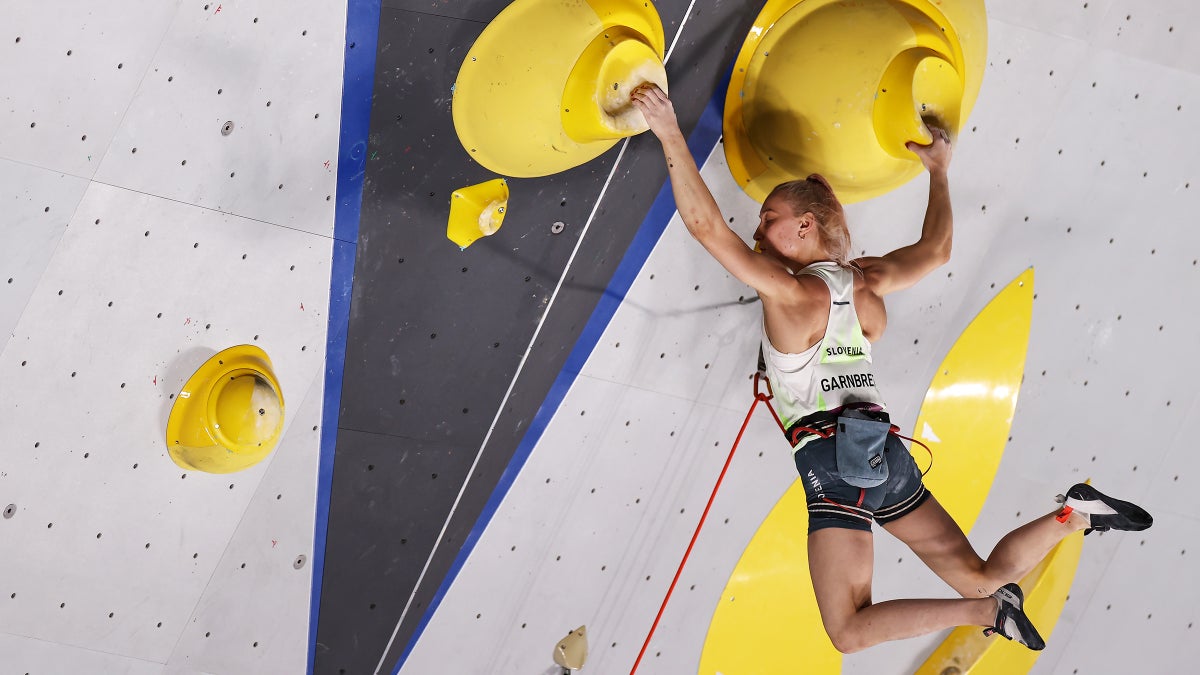No products in the cart.
Outdoor Adventure
Janja Garnbret Wins Women’s Climbing Gold
Brutal. That’s the word that comes to mind to describe the women’s combined sport climbing finals competition in its debut in the 2020 Tokyo Olympics.
Brutal route setting—with exceptionally difficult, shoulder-y movements. And brutal conditions—with the hottest temperatures and highest humidity of the week. But ultimately, the competition produced predictable results as Janja Garnbret, 22, of Slovenia, arguably the most dominant comp climber of all time, won the gold medal. Garnbret took first place in the bouldering and lead climbing events, and fifth in speed, for a total score of 5 (5 x 1 x 1).
Miho Nonaka, 24, and Akiyo Noguchi, 32, both of Japan and favorites to make the podium, took the silver and bronze medals, respectively. Nonaka went third, third, and fifth in speed, bouldering, and lead for a score of 45, and Noguchi took fourth place in all three events for a final score of 64. For Noguchi, the bronze medal marks the end of her career, as she announced her retirement from competition climbing with these Games.
Brooke Raboutou, the only American woman to make finals, came in fifth overall after some unfortunate slips in both bouldering and lead. While Garnbret was technically the only woman to reach the top of two of the three boulder problems in the bouldering round, Raboutou was right there with her—getting to the final holds on those same first two problems but then slipping off before she could show control. Raboutou’s finishing score in the bouldering event belies her performance—she climbed incredibly well.
If the boulder problems seemed too difficult to really make the event interesting and competitive, the lead route appeared even harder. Not even Garnbret could come all that close to the top, despite putting up an incredible fight and reaching the highest of any competitor. Raboutou appeared to rush a move low on the route, and came up short on a hard-to-hit two-finger pocket, leaving her visibly disappointed. Chaehyun Seo of South Korea, a lead-climbing specialist, came in second in the lead event, nearly matching Garbret’s high point. Seo’s eighth-and seventh-place finishes in speed and bouldering, respectively, weren’t good enough for Seo to make much use of this impressive second-place finish in lead.
After watching the men’s sport climbing finals yesterday, it appeared that a first-place finish in any of the events guaranteed you a medal. Alberto Gines Lopez got first place in speed and did well enough in bouldering and lead climbing that the math worked out in his favor to award him the gold medal. The same almost held true on the women’s side. Aleksandra Miroslaw, a speed climbing specialist from Poland, set a new world record to win the speed event with a time of 6.84 seconds. Miroslaw then came in eighth place in both bouldering and lead. Still, the math worked out to give her 64 points—tying Noguchi for third place. However, the combined format rules dictate that an athlete’s performance in the qualifying round acts as the tiebreaker, which is why Noguchi got the medal.
The brutal route setting led to a women’s finals that lacked much of the drama of yesterday’s men’s finals, where the gold medal came down to the very last competitor’s performance. But it’s hard to argue that Garnbret, Nonaka, and Noguchi don’t deserve their spots on the podium.
As climbing’s Olympic debut draws to a close, the conversation will inevitably turn to evaluating how the spotlight of this stage will affect the sport going forward. This week, sport climbing became the top-trending Olympic sport, according to Google Trends. And with climbing returning to the Olympics in Paris in 2024, there will be much to look forward to.
Source link

